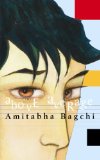“Above Average” by Amitabha Bagchi is a novel about a smart boy with a middle-class background and his life before, during and after his stay at IIT Delhi. It is the story of friendships forged and lost, love blossoming and withering. It is a coming-of-age novel that has also been termed a “campus book” because of the many recent Indian novels based on life at the IITs and the IIMs. However it is certainly one of the better-written novels of the lot.
The comparison with the other popular novel based on life at IIT, “Five Point Someone” by Chetan Bhagat, is inevitable. This book is surely the better of the two, while retaining the simplicity of language and a reasonable price. There is no straight narrative in this book as it keeps going back and forth in time and place. I was reminded of the writing-style of Amitav Ghosh while reading this book - “The Shadow Lines” does in fact make an appearance in the novel and the narrator praises its writing-style.
Our hero is an above-average academic achiever from a middle-class background, born to a Bengali family, raised in Mayur Vihar in New Delhi and has a keen interest in rock music and writing. He prepares for and gets into an IIT, where he meets people with varied backgrounds and with some of whom he forms lasting bonds. He goes on to pursue a Ph.D. in Computer Science from the US. Some of the biographical details match those of the author so much that the book seems autobiographical, at least in parts. Being from an IIT myself, I can attest that the author paints a fairly accurate picture of life in an IIT, though with a little exaggeration here and there.
Some of the details in book were a little jarring for me. For example, our hero, majoring in Computer Science, takes a class on Algorithms only in the third year and describes it as the “toughest of all the theory classes we were required to take”. Algorithms is usually taught right at the beginning of the second year (if not within the first year itself), is one of the easier courses and is full of practical material. As another example, the hero is a boy in his late teens and has thoughts that are a little too mature for his age - it's not impossible, but it's unlikely. Finally, the usual confusion between “invariably” and “inevitably” is on display here, which is a little out of character for someone who is supposedly good at writing in English.
Despite what another reviewer would have you believe, this is not in the same league as “A Portrait of the Artist as a Young Man” by James Joyce or “In Search of Lost Time” by Marcel Proust. It is however a good read, well worth the time and money spent on it.
